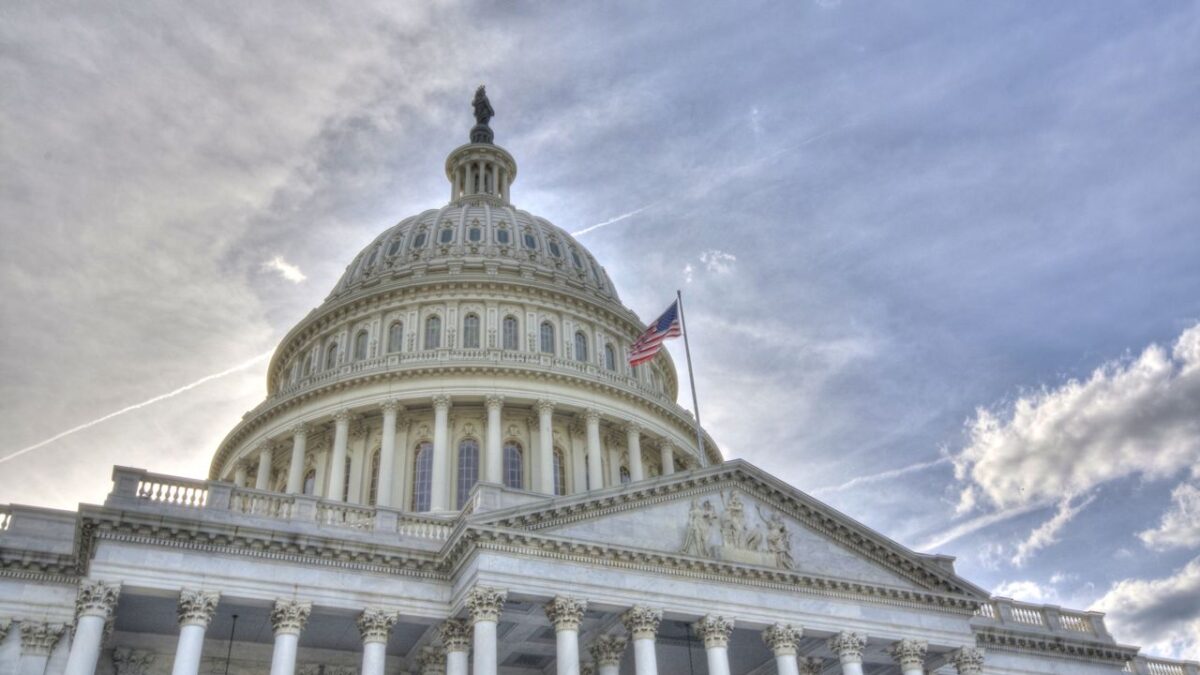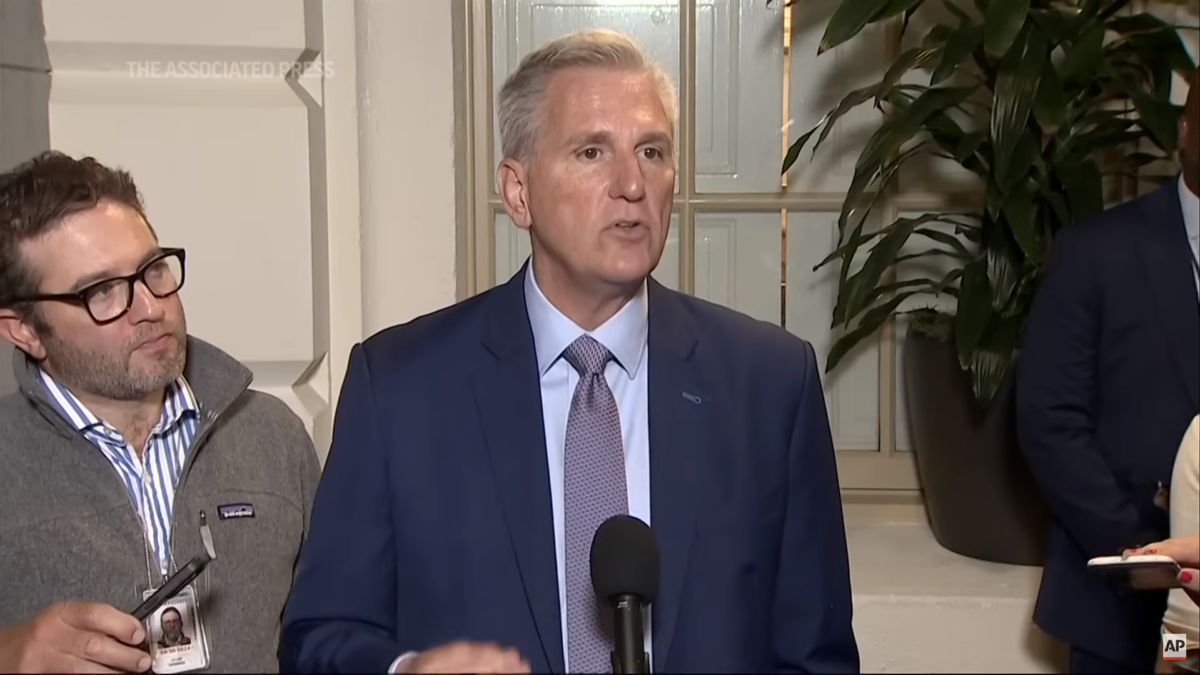Imagine if you were provided $50 million to build a tank, but you were able to do the job properly for only $32 million. In the normal world, you would be applauded for getting the job done under budget. You might even get a promotion. In Washington, D.C., you are violating the law according to many.
Under the Impoundment Control Act (ICA) — as interpreted by many in Congress and the Government Accountability Office (GAO) — if the president intentionally tries to spend less money than Congress appropriates to get the job done, he is breaking the law.
In 2019, the Democrat-controlled House impeached President Donald Trump, in part, because he paused the spending of about $200 million in funds for Ukraine for 60 days to conduct a policy review based on national security concerns. (Disclosure: Mark Paoletta served as OMB general counsel and issued the legal opinion authorizing this pause on these funds). The GAO determined that this 60-day pause violated the ICA because the president was prohibited from pausing this money despite these concerns. Congress used this pause as a basis to impeach the president. You could not dream up a more bizarre and unconstitutional attack on the presidency.
Nonsensical Appropriation Law
Enacted in 1974, the ICA made it unlawful for the president not to spend every dollar Congress appropriated regardless of whether he needed to use all the funds. This law went against 200 years of history in which both Congress and the president agreed he was not required to spend every dollar of an appropriation if he could carry out a program for less money and even, in many cases, if he disagreed with the program itself.
Appropriation laws were always meant as a ceiling, not a floor. Stretching back to our English forebears, the British Parliament used the legislative power of the purse to make it unlawful for the king to incur obligations that exceeded the appropriations provided. No one wants to incur debts they can’t pay. Parliament worried about the king spending more money than provided, not less.
That was the case in our new republic, and our founding era is replete with examples of presidents not spending the full amount of appropriated funding. The most famous early impoundment precedent came in 1803 when President Jefferson impounded a congressional appropriation of $50,000 for 15 gunboats for use on the Mississippi. The impoundment was on pure policy grounds: Jefferson did not want to provoke France during the secret negotiations over access to New Orleans and the purchase of the Louisiana Territory. Once the purchase was completed, Jefferson spent the funds.
In 1809, President James Madison, the Father of the Constitution, announced to Congress that he was reducing the crews of gunboats in New Orleans to save money that Congress had appropriated. Madison cited his policy judgment that crews and ship maintenance could be reduced to further both economy and “just precaution.” Madison evidently felt no compunction about communicating this impoundment to Congress, and Congress made no recorded objection to it.
When Congress began asserting in laws a more direct command to spend funds on specific projects, presidents rebuked them. For example, when Congress enacted the Rivers and Harbors Bill of 1876, with specific funds provided for various local projects, President Grant sent a special message to Congress stating that he would not spend funds on purely local projects. In fact, he ordered the secretary of war not to spend more than half of the $5 million appropriated for internal improvements.
When Congress passed a resolution asking the president for the legal authority to impound these funds, the secretary of war replied that appropriations were “in no way mandatory” and that it would not be constitutionally appropriate for Congress to limit the president’s discretion to impound funds in “the interests of the public service” and the “condition of the Treasury.”
Prior to and during the Second World War, President Franklin Delano Roosevelt engaged in many impoundments on programs, including refusing to spend more than $500 million in public works funds on policy objections. FDR stated that mandating full expenditure “would take away from the Chief Executive every incentive for good management and the practice of commonsense economy.” Presidents Truman, Eisenhower, Kennedy, and Johnson made wide use of the impoundment power on efficiency and policy grounds, even in the face of congressional directives to spend the funds.
President Kennedy impounded half of the $360 million budget for the B-70 strategic bomber because it was twice what the administration had requested. An enraged Rep. Carl Vinson advanced legislation providing that “the Secretary of the Air Force, as an official of the executive branch, is directed, ordered, mandated, and required to utilize the full amount of the $491 million authority granted” for the B-70 bomber.
President Kennedy forcefully rebuffed Vinson’s attempt to encroach upon his executive power, requesting that the language be changed from “directed” to “authorized” and that such language is “more clearly in line with the spirit of the Constitution.” These are only a handful of presidential impoundments throughout our nation’s history.
With the enactment of the ICA, Congress turned this robust history and tradition of presidential impoundments upside down by making every appropriation a minimum floor for spending rather than a ceiling. How did we get to a place where the ICA undoes one of our oldest and most common-sense constitutional understandings?
In light of the battles over the Vietnam War and Watergate, the executive was seriously weakened, and Congress moved to further weaken the presidency. In June 1974, as President Nixon was in the death throes of the Watergate scandal, Congress passed the ICA. Nixon signed it into law on July 12, 1974. He resigned less than a month later.
It did not help that, utterly ignoring the multitudes of examples going back to the early days of our republic demonstrating the opposite, then-Assistant Attorney General William Rehnquist issued a legal opinion in 1969 that claimed the president did not have impoundment powers. Rehnquist did that again when, as chief justice, he authored one of the worst opinions in modern times on the separation of powers, Morrison v. Olson, which allowed federal judges to appoint prosecutors.
Appeasing Special Interests with Reckless Abandon
The ICA is not just ahistorical and unconstitutional, it has caused Congress to appropriate funds to satisfy special interests with reckless abandon and to thwart the president’s exercise of his constitutional authority. The ICA prevents the president from spending funds on programs in a thoughtful and responsible manner and unconstitutionally invades his decision-making authority.
For example, if Congress appropriates funds to provide $100 million in foreign aid to a foreign country, and that country is found to have provided funding for a terrorist attack on the United States, the president would be violating the ICA if he did not provide the $100 million. The ICA does not contemplate presidential decision-making and his own judgment as chief executive and commander-in-chief.
Though the president can propose a rescission if he does not want to spend these funds, this cumbersome mechanism requires Congress to pass a new law rescinding appropriated funds, which is unlikely considering congressional dysfunction and constitutionally unnecessary given the president’s long-recognized impoundment power.
Should President Trump be reelected this fall, consistent with every president from Washington to the ICA’s enactment, he should immediately use his constitutional authority to impound funds based on efficiency and targeted constitutionally based policy grounds. Such actions will help bring some sanity to the mindless spending that has increased our debt to unsustainable levels and check funding programs that don’t work. Challenging the Impoundment Control Act is a worthy battle in the larger war to reestablish constitutional executive powers that Congress has usurped over the past several decades.









